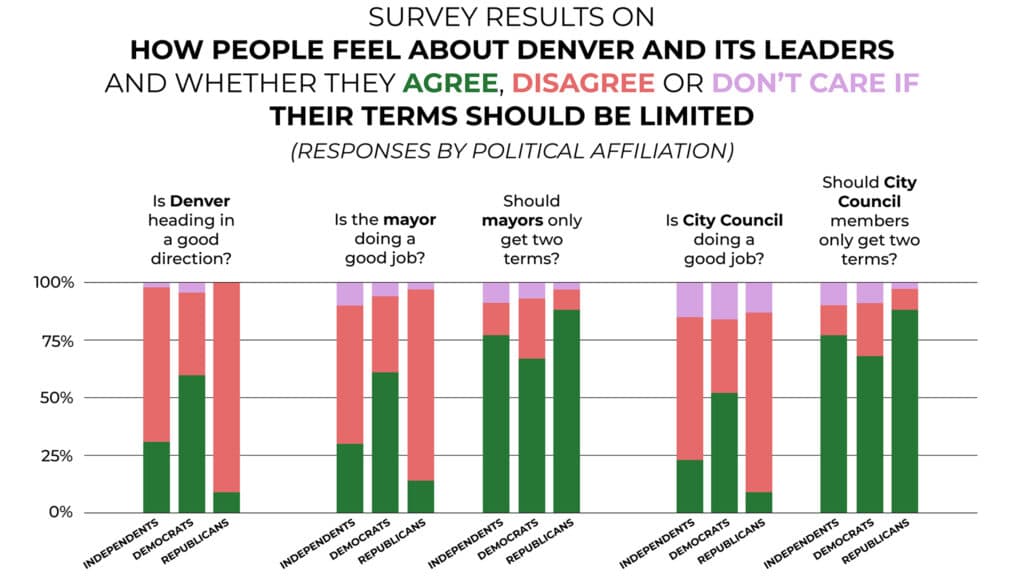A survey of nearly 1,600 Denver voters across the city found that 74% of people asked would support shortening the city’s term limits for Mayor and City Council from three terms to two terms.
Currently, elected officials in Denver serve three terms. While newcomers sometimes oust incumbents on City Council, Denver has a history of electing Mayoral incumbents until they hit their limit or decide not to run for reelection.
Councilmembers Amanda Sawyer and Amanda Sandoval first started researching the city’s term limits last year, citing constituents bringing up the issue with them while on the campaign trail in 2023. On Monday, they revisited the conversation with the poll results in Council’s budget and policy committee.
What else did the poll find?
The poll also showed support for term limits for Denver’s Auditor and Clerk and Recorder, two other elected positions at the city.
“People are frustrated with incumbents, they’re concerned about policy priorities, there’s a desire for change, people mentioned immigration policy,” Sawyer said. “There was significant support across the board for term limit change.”

Arguments in support of term limits point to how elections favor incumbents. Shorter term limits can also promote newer faces and fresher ideas in elected bodies.
But shorter term limits can also grow longtime lobbyist power as politicians turn over more quickly, as well as decrease institutional knowledge in the city.
“I think a shorter term limit discourages voting for just a familiar name and promotes a more informed electorate and fresh ideas,” one survey respondent wrote in the poll.
Keeping in mind the small sample size, the poll also included approval ratings of the Mayor and Councilmembers. Of those surveyed, 50% disapproved of Mayor Mike Johnston, 43% approved and 7% said they had no opinion.
On City Council, 49% said they disapproved of the body as a whole, while 36% approved and 15% marked that they had no opinion.

Residents of District 2, represented by Councilmember Kevin Flynn, had the highest disapproval rating at 60%. Residents of District 8, represented by Councilmember Shontel Lewis, had the highest approval rating of City Council at 45%.
Overall, 55% of respondents said they thought Denver was on the wrong track. 42% said they thought the city was on the right track, and 3% had no opinion.
A number of Councilmembers opposed shortening term limits and said they had not heard similar concerns on the campaign trail.
Councilmember Kevin Flynn expressed skepticism about such a small poll, and said that City Council already turns over pretty regularly. When the new City Council was sworn in last year, six of the 13 members were first-timers.
“We shouldn’t rule by poll,” he said.
Flynn pointed to Denver’s strong mayor system, which gives the mayor power over city appointments and much of city operations. With shorter Council turnover, he said that could give up the little power City Council does have.
According to research from Sawyer’s office, the majority of cities that have term limits let elected officials serve two terms, not three. But Flynn pointed out that more than half of cities with strong mayor systems have no term limits at all.
“Reducing these term limits from three to two would further weaken this body’s ability to be a true challenge to the people on the third floor here,” Flynn said, referring to the Mayor’s office, which works on the third floor of the City and County building.
Councilmember Paul Kashmann, who is serving his third term, pointed to institutional knowledge that accumulates with three terms, as well as the idea that voters already weigh in on how many terms a Councilmember should have when they run for reelection the second and third time.
“I think it takes a long time to really understand this job, to establish the relationships that we need to get things done,” he said.
It’s unclear whether Sandoval and Sawyer will move toward bringing any formal legislation to Council or push to put the question of term limits on the ballot.
On Monday, the two Councilmembers told Denverite they are not yet sure of their next plans with potential term limit changes.













